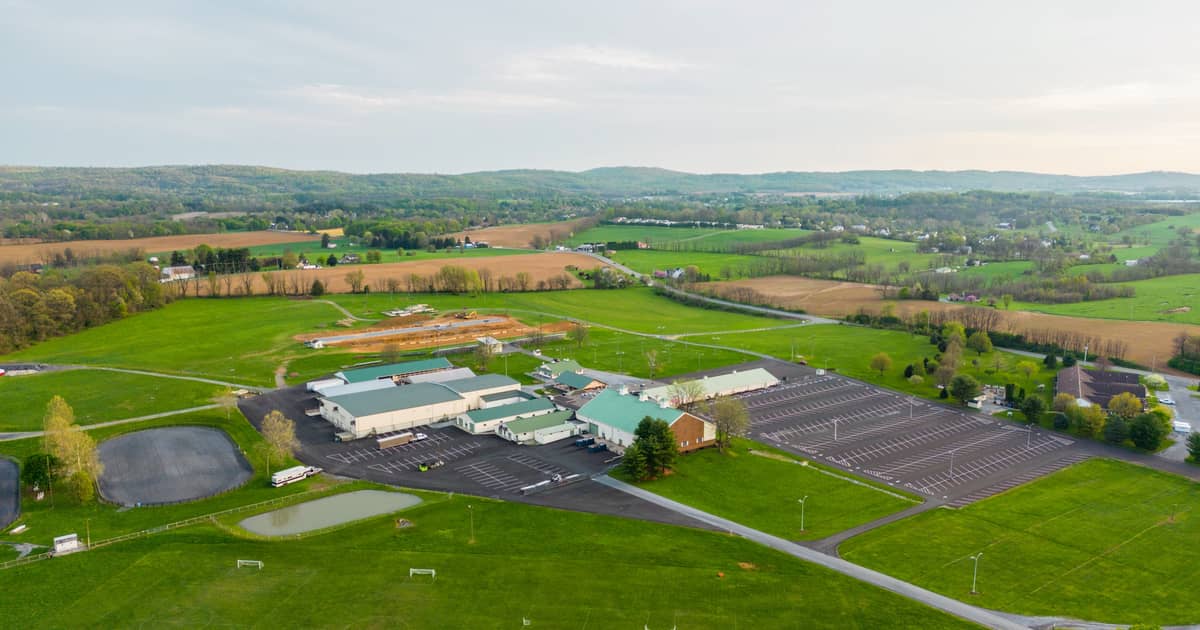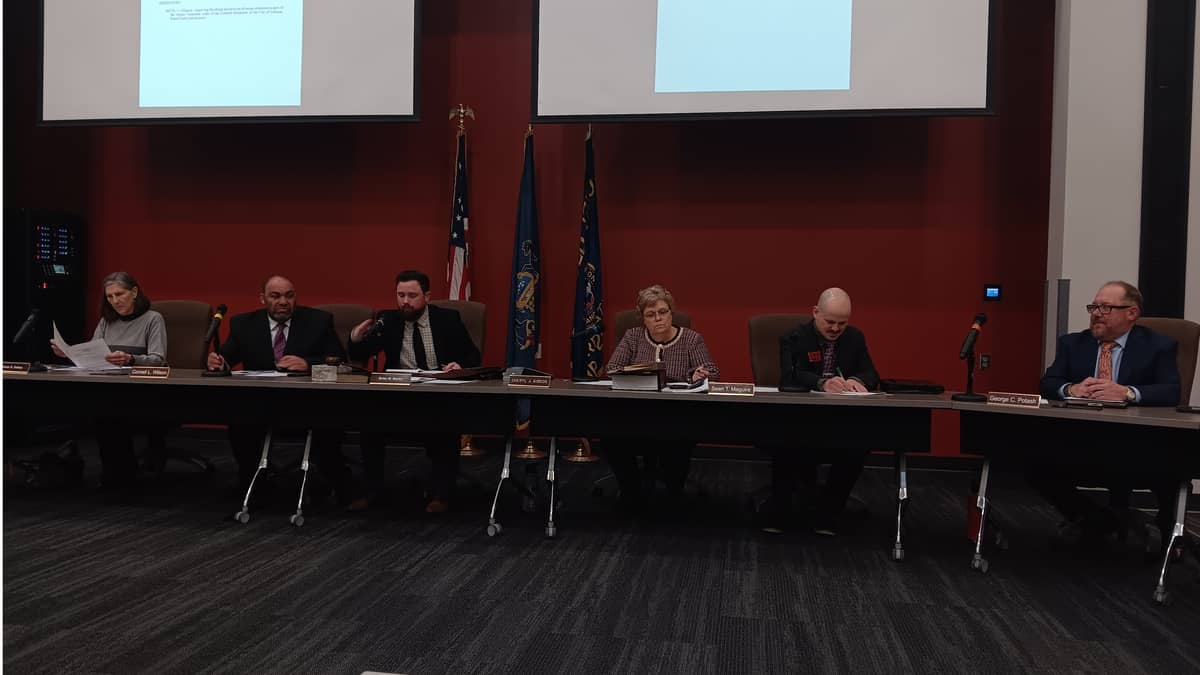Lebanon County government working collaboratively with township and borough officials to create a new comprehensive plan was a key takeaway of the 108th annual convention of local municipal officials on Thursday, Oct. 12.
Lebanon County planning director Julie Cheyney told LebTown after the convention that she felt one commissioner summarized succinctly how municipal officials are vital stakeholders in the design and implementation of the new county comprehensive plan.
“Commissioner (Mike) Kuhn really summed it up the best,” said Cheyney about comments made during a segment with county commissioners. “If you want to have a plan that’s going to be effective, you need not only the input, but you’re going to need people in key positions to generate and make that implementation happen. You can’t say I want to have a good plan and not be willing to step up to the plate to implement it.”
While there was one 30-minute segment on the agenda designated for a specific comprehensive plan presentation by Michelle Brummer, senior planner for Gannett Fleming Inc., and Cheyney, others were either tied to the plan or included comments about it.

This year’s convention had a county-centric theme, according to local municipal chapter president Mike Wahmann. Other presenters included representatives from the county’s GIS and transportation planning departments giving departmental updates. The event began with remarks by Katie Lizza, a policy research analyst with the Pennsylvania State Association of Township Supervisors, who highlighted new association programs and gave a legislative update.
Brummer, whose Camp Hill-based company crafted the 2007 county comprehensive plan, gave a plan overview to the approximate 80 attendees and then facilitated a discussion while Cheyney took notes.
Annville Township manager Candie Johnson said municipal officials also need to work together because decisions made in one municipality impact the standard of living in bordering ones as well.
Read More: Annville Township manager Candie Johnson relishes chance to serve her hometown
“One of the things that I think is key in this comprehensive plan is that we need to worry about our neighbors and what impact the neighboring municipality will have on (its) neighboring municipality,” said Johnson. “And we’re not doing that. We’re not being good stewards, we’re not working together.”
Johnson gave the construction of warehouses in South Annville Township as an example of a decision made in one municipality impacting its neighbors.
Read More: Your guide to the warehouses under construction in South Annville Twp.
“There was no conversation about what that impact would be to Annville Township, and 422, 934, 322, and that upsets me that we are not working as a team of Lebanon countians and making Lebanon County stronger and not just worrying about our own municipality,” said Johnson. “It’s always been you worry about you and we’ll worry about ourselves.”
Johnson implored her colleagues to think about the kind of future they want for Lebanon County.
“We need to think about what’s best for the future. … We’re in 2024 almost and we have to work together to really make this a Lebanon County comprehensive plan,” she said. “Not just the commissioners, not just that guy or that municipality. We need to come down to the little guys and say, ‘what do you need?’”
Brummer said there was discussion at an initial planning session in August involving her firm and the commissioners concerning the future composition of Lebanon County.
Read More: Lebanon County launches process to craft new 10-year comprehensive plan
“We did have some conversation in August about identity,” said Brummer. “What is Lebanon County? I think we all have an understanding of what Lebanon County has been. Candie, I hear you raising the point of what it’s going to be in the future. How’s it going to be different? How is the identify from our history and heritage still a threat in that future? It doesn’t need to be abandoned, but many things sort of affecting change.”
Johnson noted her children and those of others in the room decide to live elsewhere with Brummer responding that the plan needs to have a vision that incorporates the needs of future generations, not just the next 10 years.
“What are we sort of creating and working toward and putting policies and infrastructure in place for that next generation,” said Brummer. “That’s going to affect their opportunities or their constraints, whether it’s around housing, or about job availability or about open space, recreational opportunities and all sorts of things like that.”
Nicole Mauer Gray, executive director for the Community Health Council of Lebanon County, highlighted the need for more affordable and available housing as part of her presentation on the state of Lebanon County, which included a discussion after the recent release of a housing study presented to county commissioners in September.
Read More: New study highlights countywide housing problems, provides potential solutions
Gray showed the disparity between the income levels of local residents and the cost of residential housing, adding there is a plethora of low-wage jobs and not higher-paying positions.

“Because so many jobs in the county are at the entry-level region in median and per capita income, when compared to our surrounding counties, we’re the second lowest in both categories, and we’re behind the state and the country,” said Mauer.
Gray said of the 54,906 households in Lebanon County, 19,470, or nearly 35.5 percent, live below the ALICE threshold, which means they are asset-limited, income-constrained, and employed individuals who earn more than the federal poverty level but not enough to afford basic necessities where they live.
ALICE households are among the majority of the most common occupations in Lebanon County and those positions have insufficient wages for workers to pay for a typical rental (median average of $1,290 a month) or average priced for-sale unit at $240,000.
Only two of the top 10 countywide occupations – registered nurses and general and operations managers – earned enough income to any rental or for-sale unit.
Housing availability is also an issue with countywide for-sale housing at 0.3 percent or 0.9 months of inventory, and both multifamily apartment and non-conventional rentals at over 99 percent occupancy rate.
“A balanced community would have three to four months (of inventory),” said Gray. “Having 99 percent is across subsidized housing, rentals and market rate. What we can use is more housing across all affordability levels in every corner of the county to help make well-balanced workforce and community patterns. If we continue to bring in low-wage, low-skill jobs, we must consider bringing in more affordable housing options.”
Asked after the meeting how much the design of a new comprehensive plan might cost, Cheyney said it’s too early to tell since her department is still determining how broad it needs to be. Plan design is expected to begin in early 2024 and tentatively take 12 to 18 months to complete.
Cheyney said her department is currently conducting outreach to gather information from stakeholders like those township and borough officials who attended the convention at the Lebanon Valley Expo Center, noting that additional information gathering will occur in the weeks ahead.
“We need the scope of work, so what we did with the commissioners (in August) was a starting point and the information that we receive from the municipalities will also help form or shape that scope of work,” said Cheyney. “That scope of work will determine the price tag and once we know the price tag, then we can reach out to funding sources.”
Cheyney added that potential funding sources include the Pennsylvania Department of Transportation and the Pennsylvania Department of Community and Economic Development, among others, with the county also probably being required to show it has “some financial skin in the game.”
Questions about this story? Suggestions for a future LebTown article? Reach our newsroom using this contact form and we’ll do our best to get back to you.

Become a LebTown member.
Cancel anytime.
Monthly Subscription
🌟 Annual Subscription
- Still no paywall!
- Fewer ads
- Exclusive events and emails
- All monthly benefits
- Most popular option
- Make a bigger impact
Already a member? Log in here to hide these messages
An informed community is a stronger community. LebTown covers the local government meetings, breaking news, and community stories that shape Lebanon County’s future. Help us expand our coverage by becoming a monthly or annual member, or support our work with a one-time contribution. Cancel anytime.

























